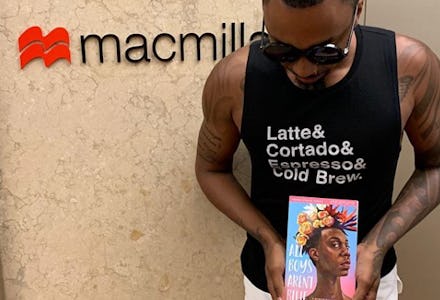Toni Morrison's writing is a unique form of political resistance. Here's how I plan to keep it alive

It was early 2017 when I got this Toni Morrison quote tattooed on my arm: “If there's a book that you want to read, and it hasn’t been written yet, then you must write it." It was one I first heard in an English course I took at my HBCU, Virginia Union University, over a decade ago. The line stuck with me as a navigated my 20s, trying to figure out the world — more specifically, how my Blackness would be centered in it.
It was the quote that pushed me to begin telling the kind of story I never read because it didn't exist: my upcoming young adult memoir called All Boys Aren’t Blue. Through it, I want to ensure Black queer boys can read the story I should have had growing up. The moment it got picked up by a publisher was just another reminder that Morrison’s mere existence is an act of political resistance and freedom — and that I am a part of it.
The story I always wanted to write was one of the Black Queer experience in America. After leaving my full-time career in finance a few years ago, I’ve embarked on a literary journey of exploration of and appreciation for my Blackness — it’s been at the center of all of my work, the way Morrison’s was. Writing about, and specifically to, a Black audience has always been a form of activism. Morrison was revolutionary because she became a catalyst for a movement for writers like me: She wasn’t an American writer who happened to be Black. She was a Black woman who was an American writer, and her work firmly clung to her culture and her people above all else.
Another one of my writer heroes, Joseph Beam, said, “Black men loving Black men is [a] revolutionary act.” I often think about how these words, along with Morrison’s concept of authentic storytelling, inform my work and my very existence. For me, it isn’t just about reading the words written by our community’s social justice-oriented scribes; it’s about what we do with the words after we read them.
What are you going to do now that you know about your background, your place in the world, and how you fit into the pervasive norm of whiteness? What choices do those words give you access to? The words are crucial but it is “the act” that, in turn, makes them revolutionary.
As a Black writer, I aim to carry on the responsibility and honor or telling our stories candidly and thoughtfully by continuing to write the stories about our experiences, our hopes, joys, and our tragedies. I’ll continue to put content into the world and take up space in places we’ve historically been denied access to. And just as Morrison urged her students to, I’ll use my power to break spaces open and get others in, giving Black folks whose stories have been silenced a place to shout.
It can get exhausting at times, but now isn’t the time to stop. Morrison’s resilience showed us we have the power to speak without feeling pressured to appease to a mainstream white audience. The rebellion and revolution are the work we do as Black folk, as a collective. We can reject the notion of hoarding power, and instead use as the gateway to get us all through. Toni’s words let us all in, not just to her but to ourselves and our community.
It’s unfathomable to think about the enormity of the impact Morrison has had on Black writers like myself. She entered a room that so many others were not able to set foot in, not by playing nice but by speaking truth and committing to her art (a feat that couldn’t be easy in a world that so blatantly disrespects Black women).
For me, mourning Morrison will fade into writing, teaching, and working to ensure that Black artists always have a way to center their identity in whatever they create, if they so choose.